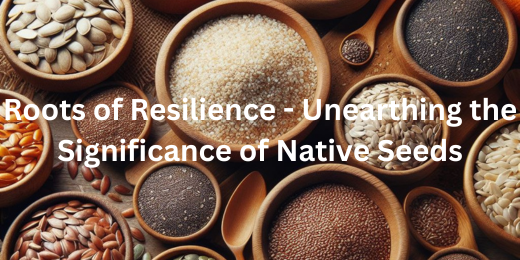
Roots of Resilience – Unearthing the Significance of Native Seeds
Benefits of native seeds
Introduction: The Heritage in Our Seeds
The importance of native seeds in South Indian culture runs deep, like the roots of a banyan tree. As an old Tamil proverb goes, “A handful of native seeds is a handful of gold.” These seeds are not just agricultural commodities but bearers of tradition and resilience. However, amidst modernization and genetically modified seeds, native seeds’ importance is fading, threatening biodiversity and traditional farming practices.
Benefits of native seeds’ conservation extend beyond agriculture. These seeds are resilient to local pests and weather conditions, requiring fewer inputs like pesticides and water. Embracing native seeds also nurtures biodiversity, preserving unique plant varieties and safeguarding ecosystems. Yet, amidst the allure of high-yield hybrids, their importance is often overlooked.
In preserving native seeds’ importance, we safeguard our heritage and secure our future. It’s not just about agricultural yield but about sustaining traditions and ecosystems. By supporting local farmers, promoting seed exchanges, and advocating for policies that protect native seeds, we ensure that these humble seeds continue to thrive for generations to come.
Local Legends: The Power of Native Plants
Native seeds’ importance is deeply intertwined with the rich tapestry of South Indian culture and history. Across generations, communities have revered plants like sandalwood, neem, and sacred basil, recognising their medicinal, spiritual, and economic value. These plants are not just botanical specimens but living legacies, embodying the wisdom of our ancestors.
In the diverse landscapes of South India, native seeds have evolved remarkable adaptations to thrive in varying climates and soil conditions. From the lush forests of the Western Ghats to the arid plains of Tamil Nadu, these plants demonstrate nature’s resilience and ingenuity. Their ability to withstand droughts, pests, and diseases makes them invaluable assets in sustainable agriculture.
Preserving the benefits of native seeds is not just about conserving plant species; it’s about honouring cultural heritage and promoting ecological harmony. By embracing traditional knowledge and practices, we can harness the power of native seeds to build resilient food systems and protect biodiversity for future generations to cherish.
The Resilience Revolution: Why Native Seeds Matter
Native seeds’ importance lies at the heart of the resilience revolution in agriculture, echoing nature’s ability to adapt and thrive. In South India, traditional crops like rice, millets, and pulses have sustained communities for centuries, nourishing both people and the land. These native seeds are more than just sustenance; they’re the building blocks of resilient ecosystems.
By cultivating native seeds, farmers nurture soil health and fertility, promoting sustainable agricultural practices that benefit both the environment and future generations. Take, for instance, the humble cowpea, a staple in South Indian cuisine. Not only does it fix nitrogen in the soil, enriching it for other crops, but it also provides essential nutrients and sustains local biodiversity.
Embracing native seeds isn’t just a return to tradition; it’s a forward-thinking approach to food security and environmental sustainability. From the Western Ghats to the Coromandel Coast, South India’s rich biodiversity offers a treasure trove of native seeds waiting to be rediscovered and celebrated. By harnessing the resilience and wisdom encoded in these seeds, we can cultivate a healthier, more vibrant future for all.
Beyond the Garden: The Wider Impact
Native seeds’ importance extends far beyond the confines of the garden, shaping entire food systems and cultural landscapes. In South India, traditional dishes like Idly, Dosa, and Sambar owe their distinct flavours to native seeds like rice, lentils, and spices. These seeds are the bedrock of culinary traditions, connecting generations through shared meals and memories.
Supporting local seed banks and cultivating native seeds not only preserves biodiversity but also boosts local economies. By investing in indigenous agriculture, communities create jobs, stimulate small-scale industries, and foster sustainable livelihoods. Moreover, by prioritising native seeds, farmers reduce dependency on costly external inputs, enhancing resilience in the face of economic uncertainties.
Embracing the benefits of native seeds aren’t just about what we plant in the soil; they are about nurturing the roots of our culture and prosperity. By valuing traditional knowledge and supporting local initiatives, we can cultivate a future where native seeds flourish, sustaining both people and the planet for generations to come.
Sowing the Seeds of Change: What You Can Do
Native seeds’ importance cannot be overstated, and every individual can play a role in preserving them. Start by supporting local seed banks and native plant nurseries, where you can find a diverse range of indigenous seeds. Incorporating these benefits of native seeds into your home gardens or balconies not only adds beauty but also contributes to biodiversity conservation.
Another way to make a difference is by advocating for native seed conservation initiatives in your community. Raise awareness about the significance of preserving indigenous plants and the threats they face. Engage with local authorities and policymakers to promote policies that protect and promote the use of native seeds in agriculture and landscaping projects.
By taking these practical steps, we can actively participate in sowing the seeds of change. Supporting native seeds’ importance not only benefits the environment but also helps preserve traditional knowledge and cultural heritage for future generations to enjoy. Together, let’s nurture our native seeds and cultivate a greener, more sustainable future.
Conclusion: A Legacy for Future Generations
In conclusion, the legacy of native seeds’ importance is a gift we must safeguard for future generations. By recognising the benefits of native seeds and actively supporting their conservation, we ensure a sustainable future for our planet.
Let’s take action today by incorporating native plants into our surroundings and advocating for their protection. Together, we can nurture a greener, more resilient South India that thrives on the rich heritage of its native seeds.
Discover more about organic farming by visiting your nearest Uyir Organic Farmers Market or explore online at www.uyironline.in or www.uyirorganic.farm.